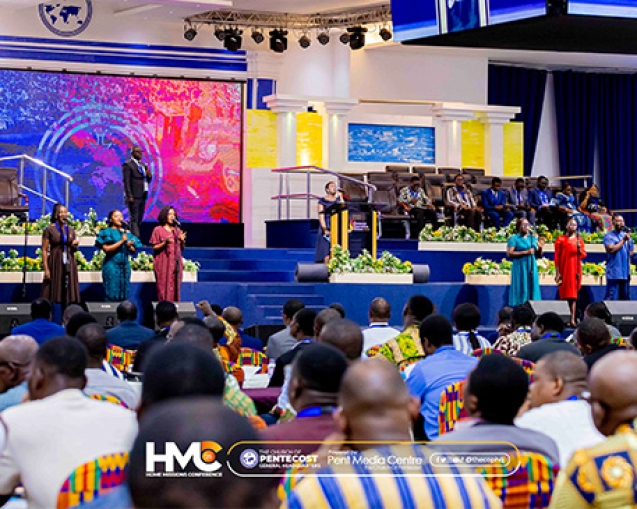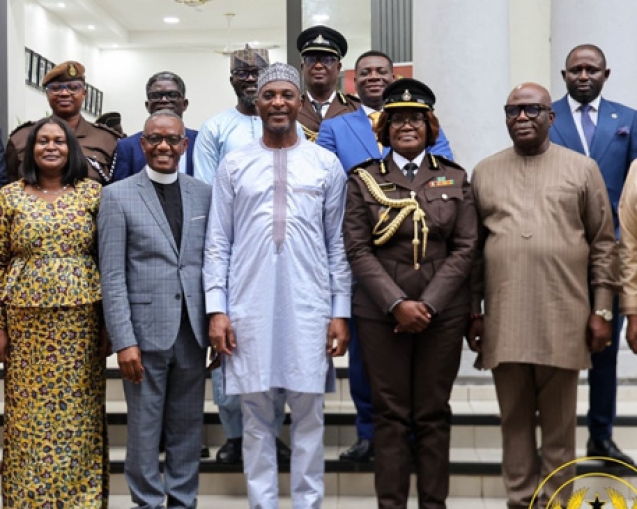It goes without an iota of equivocation that the 2024 Global All Ministers and Wives Conference, which was held from Monday, January 22 to Saturday, January 27, 2024, at the Pentecost Convention Center, has been one of a kind, unapparelled and unconventional. The conference was historic because it was a “servant to two masters”. It was to unravel the mysteries within the church’s Vision 2023 document and prepare it for Vision 2028, the church’s five–year working document. These two assignments were discharged with dexterity and finesse.
One cannot easily forget the ministrations that dripped stupendously from the throne room down the throat of the evergreen Voice of Pentecost and through to the itching ears of all and sundry. To say that the presentations from the various speakers were cutting-edge is to understate what went on throughout the sessions. All our fathers and speakers executed their assigned roles to the admiration of all.
As it was to be, our dear Chairman of The Church of Pentecost, Apostle Eric Nyamekye, took his turn to present to the Lord’s flock all that the Lord had laid on his heart for the church in the coming year. Participants agreed session after session that our chairman’s is a gift to global Christianity. One of his presentations on the “City Church Concept” cannot easily go unnoticed. Reminiscing all the slides from the presentation, one thing struck my heart, which is the focal point of this article. I realised that if the church really would stay relevant in the cities, especially in Ghana, then we cannot keep doing things the old way, something which our dearest chairman addressed throughout his presentation.
Akin to the New Wine and the Old Wineskin metaphor, as found in Luke 5:27 – 39, Matthew 9:14 – 17 and Mark 2: 18 – 22, we cannot keep applying what works in less endowed towns to ministry in the city. Jesus’ parable of the new wine and the old wineskin reveals an age-old challenge of how each generation attempts to preserve old traditions for posterity. One of the challenges Jesus dealt with during his earthly ministry was confronting archaic traditions and old Jewish ceremonial forms and practices, which were incompatible with His message about the Kingdom of God (Shenk 2005). Consequently, Jesus’ parable meant that new generations must have fresh reflections on their theological formulations and traditions. I think our dear chairman is making an equal appeal as far as the city ministry is concerned.
According to the Ghana Statistical Service, 2022 represents a peak in Ghana’s share of Urbanization with a significant percentage increase to 58.62%. A population may be defined as urban, depending on the size (population or area) or population density of the town or city coupled with available social amenities and other infrastructural developments. Looking at the rate of increase, it is expected that Ghana will have not less than 85% of its population in the cities in the next ten years, barring any change in rural life.
THE WAY FORWARD
Coupled with the thoughts above and the fact that much of the church’s strength in all indicators is urban–driven, ministry in the urban centres must be given a second look. Among many things the revered man of God postulated, the under-listed could guide urban ministry to achieve its intended purposes:
- To improve quality pastoral care, we must downsize the number of Assemblies under a minister’s care. The bigger the district, the less the supervision
- City churches must be time–conscious. Many things could be done in a succinct yet Spirit–filled way. For example, we must control the number of announcements which flood every Sunday service. Hitherto, announcements alone could take a whooping one hour. One way to achieve this is to write the announcements in the announcements’ book and not give them extempore
- The citing of churches is also very necessary. Churches should not be situated too far from accessible roads and pedestrian visibility
- We must pay attention to the quality of our services and ensure that we put much training and rehearsals into each session. We must also give contextual relevance to whatever we do during church services
- The Music department must be well-resourced. They must also have time to pray so that they do not only come to the stage to “perform” but to “minister’ to specific needs as well
- The Media Ministry of the churches must be well–empowered to improve the visibility of our churches. As much as possible, messages should be projected on screens as well, and all digital platforms such as Facebook, Twitter, TikTok and others should be explored for the church
- The district minister must, as a matter of urgency, visit these churches regularly and impact them positively
- Sermons preached on Sundays must be apt, sharp and straight from the throne room in order to have a lasting impact on the members, some of whom come to church only on Sundays for obvious reasons
- Leaders must pay attention to the protocol and hospitality department in our bid to keep old members as well as “Church – shoppers”. The age-old practice where New Comers are made to stand up to tell their mission of attending services is gradually becoming obsolete
- We must endeavour to livestream most of our services to enhance visibility
- Bible study and Home Cell leaders, as well as preachers for Sundays, must appear prepared for each session in order not to spark mistrust from the members, especially those visiting as first–timers
- Owing to the vast area of the city, we must keep proper records of members and newcomers in order to enhance pastoral care. In the city, the principle for owning a member is that “He who has the member on Sunday owns the member”. Many nominal members have only their names or ‘shadows’ in churches but owe allegiance to other churches
- The appointment of leaders to these churches must be well thought through, especially officers who will oversee the day-to-day administration of the church
- The principle of “The Discipleship” mantra should be relooked. Members could be divided into groups and given shepherds to supervise their movements in the pen. This would ensure that the “backdoor” is tightly shut
- The pastor and the laity must be all things to all people. The city is cosmopolitan in nature. Hence, leaders must, like Apostle Paul, become “all things to all people”. When necessary, they must be dynamic in nature and ministry. They should operate in all the five–fold ministry as the case may call for. They must become disciplinarians when needed and shepherds when duty calls. The needs of the members vary vastly, and a slight negligence would be catastrophic
CONCLUSION
Our dear chairman, through the instrumentation of the Holy Spirit, has intimated for the umpteenth time that the city holds a chunk of our strength. In view of this, the Pareto principle comes in very handy. This principle opines that, for many outcomes, roughly 80% of consequences come from 20% of causes. In other words, a small percentage of causes have an outsized effect. Such is the case of the City Churches and, hence, a clarion call to give these churches a second look.
Written by Pastor Bright Amankwah (Dawhenya District, Tema Area)


















